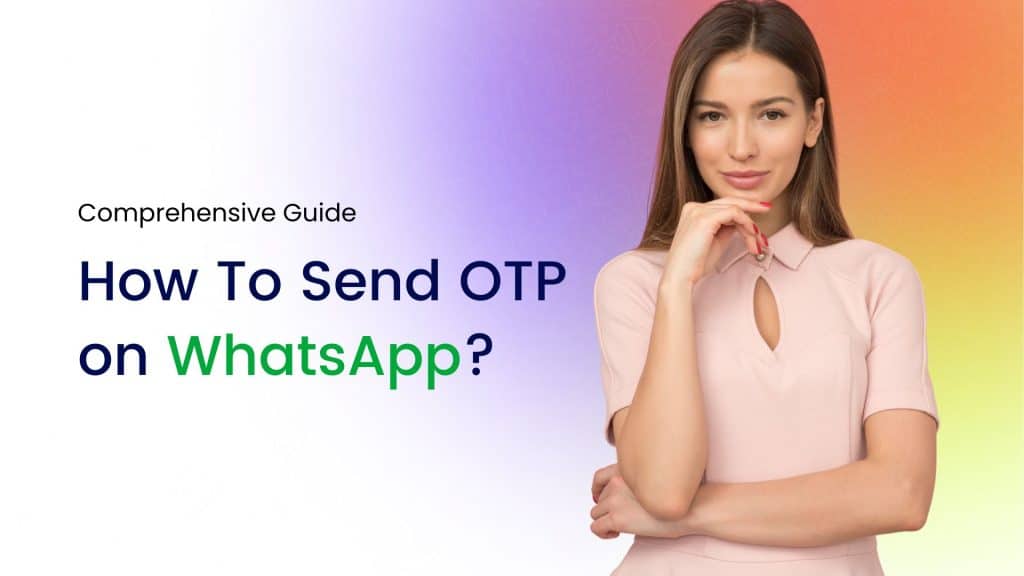In the modern digital landscape, security is paramount. As online transactions and interactions become increasingly common, the need to secure sensitive information grows more pressing. One such security measure is the One-Time Password (OTP), a temporary code used to authenticate users and secure their accounts. While OTP delivery through SMS and email is prevalent, leveraging popular messaging platforms like WhatsApp for OTP delivery offers an additional layer of convenience and security.
WhatsApp, with its extensive user base and end-to-end encryption, provides a robust platform for sending OTPs securely. Businesses and developers can integrate WhatsApp’s API to automate the process of sending OTPs, ensuring seamless and secure communication with users. Whether it’s for account verification, transaction authentication, or any other secure login process, sending OTPs via WhatsApp can enhance user experience and bolster security measures.
Here’s how you can send OTP on WhatsApp
- Integrate WhatsApp Business API: To send OTPs via WhatsApp, businesses need to integrate the WhatsApp Business API into their systems. This API allows businesses to send messages, including OTPs, to their customers securely.
- Obtain Business Verification: Before accessing the WhatsApp Business API, businesses need to undergo a verification process. This involves submitting necessary documents to WhatsApp to verify the authenticity and legitimacy of the business.
- Generate OTP: Once the integration is complete, businesses can generate OTPs using their systems or preferred authentication service. These OTPs are typically time-sensitive and unique to each user transaction.
- Send OTP via WhatsApp: Utilizing the WhatsApp Business API, businesses can send the generated OTPs directly to users’ WhatsApp accounts. The API allows for personalized messages, enabling businesses to tailor the OTP delivery experience to suit their brand identity.
- Ensure Security: While sending OTPs via WhatsApp enhances convenience, it’s crucial to prioritize security. Implementing end-to-end encryption and adhering to best practices in data protection can safeguard users’ sensitive information from potential threats.
- Monitor Delivery and Engagement: Businesses should monitor the delivery and engagement metrics of OTP messages sent via WhatsApp. Tracking delivery rates, open rates, and user responses can provide valuable insights into the effectiveness of the OTP delivery process.
- Comply with Regulations: It’s essential for businesses to comply with data protection regulations and privacy laws when sending OTPs via WhatsApp. Adhering to regulatory requirements ensures that user data is handled responsibly and ethically.
- Offer Support: In case users encounter issues with OTP delivery or authentication, businesses should provide adequate support channels. Offering assistance through customer service or chat support can enhance the user experience and foster trust.
“Secure your WhatsApp account with OTP verification. Keep your chats and personal information safe. Sign up for AutoChat today”
Sending OTPs via WhatsApp offers several advantages over traditional delivery methods. Not only does it leverage a widely-used messaging platform, but it also provides end-to-end encryption, ensuring the security and privacy of user data. By integrating the WhatsApp Business API and following best practices in security and compliance, businesses can streamline the OTP delivery process and enhance the overall user experience.
Benefits of sending OTP on WhatsApp
In today’s digital age, where online transactions and interactions have become a norm, ensuring the security of personal information and data is paramount. One significant aspect of safeguarding sensitive data is the implementation of two-factor authentication (2FA), commonly known as One-Time Passwords (OTPs). While OTPs are traditionally sent via SMS or email, the emergence of messaging platforms like WhatsApp has provided a new avenue for delivering these crucial security codes. Let’s delve into the benefits of sending OTPs on WhatsApp and how it enhances security for users.
- Convenience and Accessibility: WhatsApp boasts a massive user base, with billions of active users globally. Leveraging this platform for OTP delivery enhances accessibility for users. Since many individuals already use WhatsApp for communication, receiving OTPs through this familiar interface eliminates the need to switch between apps or platforms, making the process more convenient and user-friendly.
- Instant Delivery: Unlike traditional SMS delivery, which might suffer from delays or network issues, WhatsApp offers near-instantaneous delivery of messages. This real-time delivery ensures that users receive OTPs promptly, minimizing the risk of expiration or interception by malicious actors.
- End-to-End Encryption: WhatsApp employs end-to-end encryption, ensuring that messages, including OTPs, are encrypted from sender to receiver. This robust encryption mechanism protects the confidentiality and integrity of OTPs, reducing the likelihood of interception or tampering by cybercriminals.
- Multi-Device Accessibility: WhatsApp supports multi-device functionality, allowing users to access their accounts from various devices simultaneously. This feature ensures that OTPs can be received on any linked device, providing flexibility and convenience for users who may switch between devices frequently.
- Reduced Dependency on SMS: SMS-based OTP delivery has certain limitations, such as susceptibility to SIM swapping attacks and SMS interception. By diversifying OTP delivery channels and incorporating WhatsApp, organizations can mitigate these risks and enhance overall security posture.
- Visual Confirmation: WhatsApp enables users to verify the authenticity of OTP messages through visual indicators, such as profile pictures and contact names. This visual confirmation adds an extra layer of security, helping users differentiate between legitimate OTPs and potential phishing attempts.
- Global Reach: WhatsApp’s widespread adoption across geographical regions ensures that OTP delivery via this platform is viable for users worldwide. Whether users are located in urban centers or remote areas, they can reliably receive OTPs through WhatsApp, promoting inclusivity and accessibility.
- Integration with Third-Party Services: Many organizations integrate WhatsApp’s Business API or WhatsApp for Business platform into their authentication systems, allowing seamless OTP delivery as part of the user verification process. This integration streamlines operations for businesses while enhancing security for users.
- Improved User Experience: By leveraging WhatsApp for OTP delivery, organizations enhance the overall user experience by providing a familiar, intuitive interface for receiving security codes. This positive user experience fosters trust and confidence in the security measures implemented by the organization.
- Compliance with Regulatory Standards: As data privacy regulations become increasingly stringent, organizations must adhere to compliance requirements governing the handling of sensitive information, including OTPs. Utilizing secure messaging platforms like WhatsApp for OTP delivery helps organizations meet regulatory standards and demonstrate their commitment to data protection.
OTP on WhatsApp – Use Case Examples
WhatsApp, one of the world’s most popular messaging platforms, has evolved beyond personal communication to become a powerful tool for businesses. Among its array of features, the use of One-Time Passwords (OTPs) stands out as a crucial element in securing accounts, verifying identities, and facilitating transactions. Here, we delve into the multifaceted use cases of OTP on WhatsApp, showcasing its versatility across various sectors.
Authentication and Account Verification
In the realm of digital security, verifying user identities is paramount. OTPs serve as a robust mechanism for authentication, ensuring that only authorized individuals gain access to accounts or services. WhatsApp leverages OTPs to verify new accounts, safeguarding against unauthorized access and bolstering user confidence in the platform’s security measures. Whether it’s signing up for a new account or logging into an existing one, users can rely on WhatsApp’s OTP system to fortify their digital presence.
Two-Factor Authentication (2FA)
Enhancing security measures, WhatsApp integrates OTPs into its two-factor authentication (2FA) process. By requiring users to input a temporary code sent via WhatsApp along with their regular credentials, 2FA adds an extra layer of protection against unauthorized access. This is particularly vital for sensitive accounts, such as banking or healthcare portals, where the stakes are high. With WhatsApp OTPs, businesses can bolster their security infrastructure and mitigate the risk of data breaches or identity theft.
Transaction Authorization
The rise of digital transactions necessitates robust verification protocols to ensure seamless yet secure financial interactions. WhatsApp OTPs serve as a trusted means of authorizing transactions, whether it’s confirming online purchases, validating money transfers, or authenticating payments. By sending OTPs directly to users’ WhatsApp accounts, businesses streamline the verification process, minimizing friction and enhancing user experience. From e-commerce platforms to banking institutions, WhatsApp OTPs facilitate swift and secure transactions, instilling trust among consumers.
Appointment Reminders and Confirmations
In service-oriented industries such as healthcare, hospitality, or consultancy, appointment management is critical for operational efficiency and customer satisfaction. WhatsApp OTPs prove invaluable in sending appointment reminders and confirmations to clients or patients, ensuring they stay informed and engaged. By dispatching OTPs along with appointment details, businesses reduce the likelihood of no-shows or scheduling conflicts, optimizing resource utilization and fostering positive client relationships.
User Engagement and Feedback Collection
Beyond security and transactions, WhatsApp OTPs serve as a conduit for user engagement and feedback collection. Businesses leverage OTPs to solicit customer feedback, conduct surveys, or gauge satisfaction levels regarding products or services. By sending OTP-protected messages prompting users to provide input, businesses can gather valuable insights while maintaining data integrity and anonymity. This interactive approach fosters a sense of inclusivity and transparency, strengthening the bond between businesses and their clientele.
WhatsApp OTP vs SMS OTP: Which is More Secure?
In the digital age, where personal information is constantly at risk of being compromised, ensuring secure authentication methods is paramount. One such method widely used is the One-Time Password (OTP), which provides an additional layer of security by requiring users to verify their identity through a unique code sent to their registered mobile number. While SMS OTPs have been the traditional choice, the emergence of messaging platforms like WhatsApp has introduced a new avenue for OTP delivery. But which method offers better security: WhatsApp OTP or SMS OTP?
Understanding SMS OTP
SMS OTP involves sending a unique code via text message to the user’s mobile number. This method has been widely adopted by various online services and is considered relatively straightforward. However, it does have its drawbacks. SMS messages are transmitted over cellular networks and can be intercepted by malicious actors using techniques such as SIM swapping or intercepting insecure communication channels.
Additionally, SMS OTPs rely on the security of the user’s mobile network and device. If a user’s phone is lost or stolen, there is a risk that unauthorized individuals could gain access to the OTP and subsequently compromise the user’s accounts.
Exploring WhatsApp OTP
WhatsApp OTP is a newer method of authentication that leverages the popular messaging platform to deliver one-time passwords. Unlike SMS OTP, which relies on the cellular network, WhatsApp messages are encrypted end-to-end, providing an extra layer of security. This encryption makes it significantly harder for hackers to intercept OTPs in transit.
Moreover, WhatsApp OTP offers the convenience of receiving OTPs directly within the messaging app, eliminating the need to switch between messaging and other applications. This streamlined process enhances user experience while maintaining security.
However, WhatsApp OTP is not without its limitations. It requires users to have an active internet connection and access to the WhatsApp application, which may not always be feasible in areas with poor network coverage or for users with limited data plans. Additionally, WhatsApp accounts are tied to phone numbers, which could potentially expose users to similar risks as SMS OTPs if their phone number is compromised.
Security Comparison
When comparing the security of WhatsApp OTP and SMS OTP, several factors come into play. SMS OTPs are susceptible to interception through various means, including SIM swapping and phishing attacks targeting mobile networks. On the other hand, WhatsApp OTPs benefit from end-to-end encryption, making them significantly more secure during transmission.
However, the security of both methods ultimately depends on the user’s adherence to best practices, such as safeguarding their device and avoiding phishing attempts. While WhatsApp OTP offers enhanced security through encryption, it is still essential for users to exercise caution and remain vigilant against potential threats.
Can I Send WhatsApp OTPs Internationally?
In today’s digital age, WhatsApp has become an integral part of communication for millions of people worldwide. From staying in touch with family and friends to conducting business conversations, the messaging platform has revolutionized how we interact. One common feature used for security purposes is the One-Time Password (OTP). But can you send WhatsApp OTPs internationally? Let’s delve into this question.
Understanding WhatsApp OTPs
Before exploring the international aspect, let’s grasp the concept of WhatsApp OTPs. One-Time Passwords are temporary codes sent to users to verify their identity during the login process. These OTPs are typically sent via SMS or through messaging platforms like WhatsApp.
WhatsApp’s OTP feature is primarily utilized when users set up their accounts or when they’re logging in from a new device. It adds an extra layer of security, ensuring that only the rightful owner can access the account.
Sending WhatsApp OTPs Internationally
The ability to send WhatsApp OTPs internationally depends on several factors, including WhatsApp’s policies and the telecommunication infrastructure of the countries involved. Here’s a breakdown:
- WhatsApp’s Policy: WhatsApp is known for prioritizing user privacy and security. Therefore, the platform may have restrictions on sending OTPs across international borders to prevent misuse or security breaches.
- Telecommunication Regulations: Sending OTPs via WhatsApp involves collaboration between the platform and telecommunication service providers. Some countries may have stringent regulations or restrictions on the exchange of sensitive information across borders, which could affect the delivery of OTPs.
- Global Reach: WhatsApp boasts a vast global user base, and it endeavors to provide consistent services worldwide. However, disparities in network coverage and reliability may impact the delivery of OTPs in certain regions.
- User’s Location: The ability to receive WhatsApp OTPs internationally can also depend on the user’s location and the policies of their local telecommunication service providers.
Alternatives and Workarounds
If you find yourself unable to receive WhatsApp OTPs internationally, there are alternative methods to consider:
- SMS: In many cases, when WhatsApp OTPs cannot be sent via the platform, users can opt to receive OTPs via SMS. Most online services offer this as a fallback option for verification purposes.
- Virtual Private Network (VPN): Using a VPN service may sometimes bypass geographical restrictions, allowing users to receive WhatsApp OTPs internationally. However, it’s crucial to choose a reliable VPN service and ensure compliance with local laws.
- Contacting Support: If you encounter difficulties receiving OTPs internationally, contacting WhatsApp’s support team or the respective service provider for assistance could provide insights or solutions tailored to your situation.
Do users need to pay to receive OTPs on WhatsApp?
In the realm of digital communication, WhatsApp stands out as one of the most popular messaging platforms globally, connecting billions of users every day. With its widespread adoption, users often rely on WhatsApp for various purposes beyond simple messaging, including receiving One-Time Passwords (OTPs) for authentication processes. However, recent rumors and misinformation have stirred confusion among users regarding whether they need to pay to receive OTPs on WhatsApp. Let’s delve into this matter to clarify the situation.
First and foremost, it’s essential to understand the purpose of OTPs. OTPs serve as a crucial security measure, especially in online transactions and account logins, providing an additional layer of verification to ensure the user’s identity. When users initiate actions such as logging into a new device or making transactions, platforms often send OTPs via SMS or messaging services like WhatsApp to confirm the legitimacy of these activities.
However, WhatsApp itself does not charge users for sending or receiving OTPs. The service is free to use for messaging, voice calls, video calls, and even for receiving OTPs. WhatsApp’s business model primarily relies on providing a seamless messaging experience while exploring avenues for monetization through features like WhatsApp Business API for enterprises.
The confusion surrounding payment for OTPs likely stems from misconceptions or misinformation. WhatsApp has remained steadfast in its commitment to providing a free messaging service without imposing charges on users for essential functionalities like OTP delivery. Any claims suggesting otherwise are unsubstantiated and should be treated with skepticism.
Moreover, WhatsApp continually enhances its security features to safeguard user privacy and data integrity. End-to-end encryption ensures that messages, including OTPs, remain confidential and inaccessible to unauthorized parties, bolstering trust among users regarding the platform’s security measures.
While WhatsApp remains free for users, it’s worth noting that standard data charges may apply as per the user’s mobile carrier plan. This applies not only to sending and receiving messages but also to any data-intensive activities within the app, including media downloads and voice/video calls. Users should be mindful of their data usage to avoid unexpected charges from their service providers.
Conclusion
leveraging WhatsApp for OTP delivery is a strategic move for businesses looking to bolster their security measures while providing a seamless user experience. By following the steps outlined above and prioritizing security and compliance, businesses can harness the power of WhatsApp to securely deliver OTPs and authenticate user transactions.
Sending OTPs on WhatsApp offers a myriad of benefits, ranging from enhanced security and convenience to improved user experience and regulatory compliance. By leveraging the capabilities of this popular messaging platform, organizations can fortify their authentication processes and safeguard sensitive data against emerging cyber threats. As the digital landscape continues to evolve, integrating WhatsApp for OTP delivery represents a proactive step towards strengthening cybersecurity measures and preserving user trust in online interactions.







